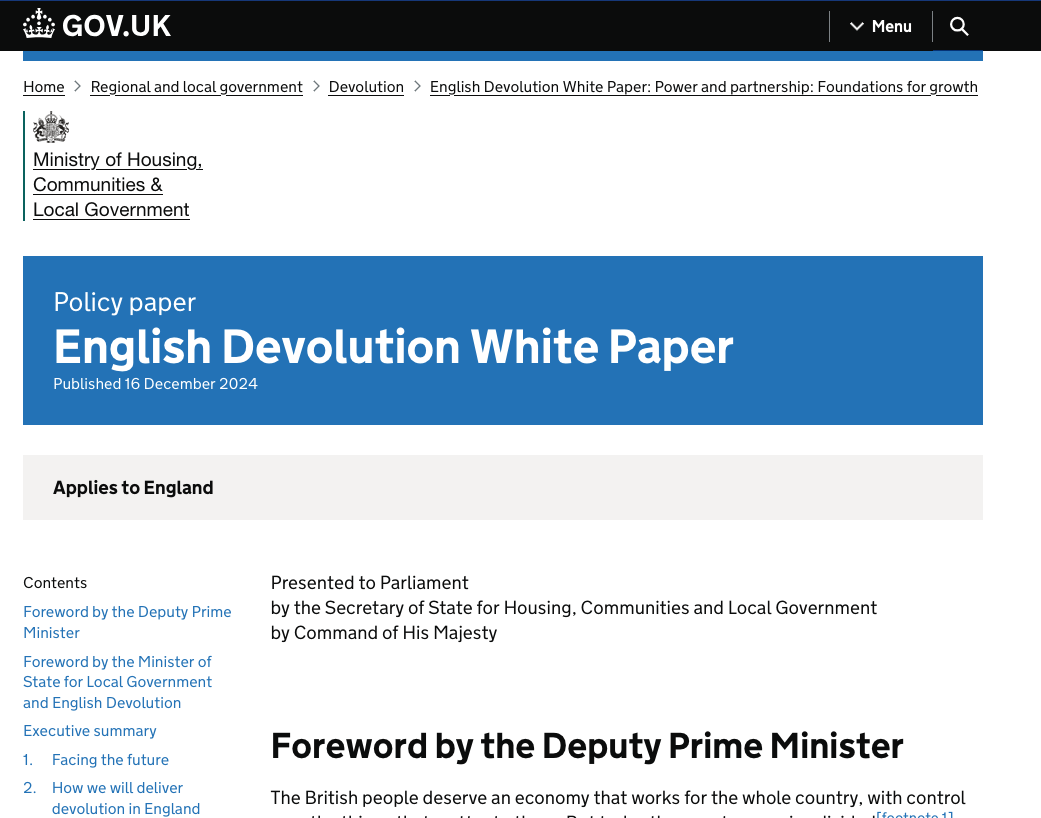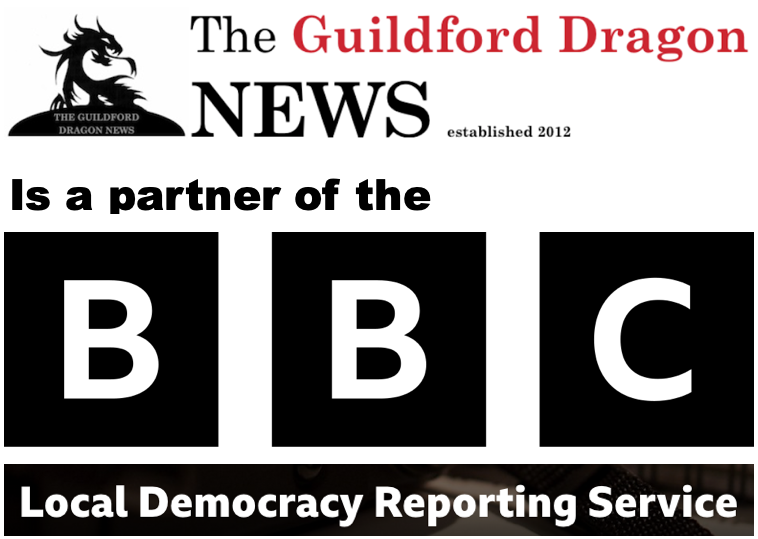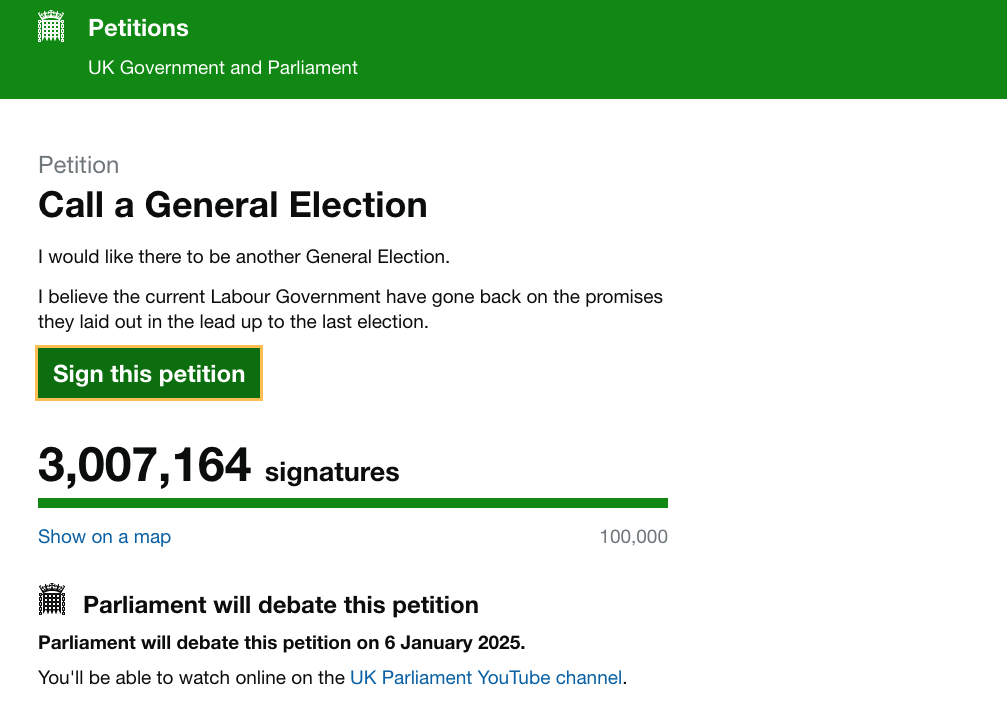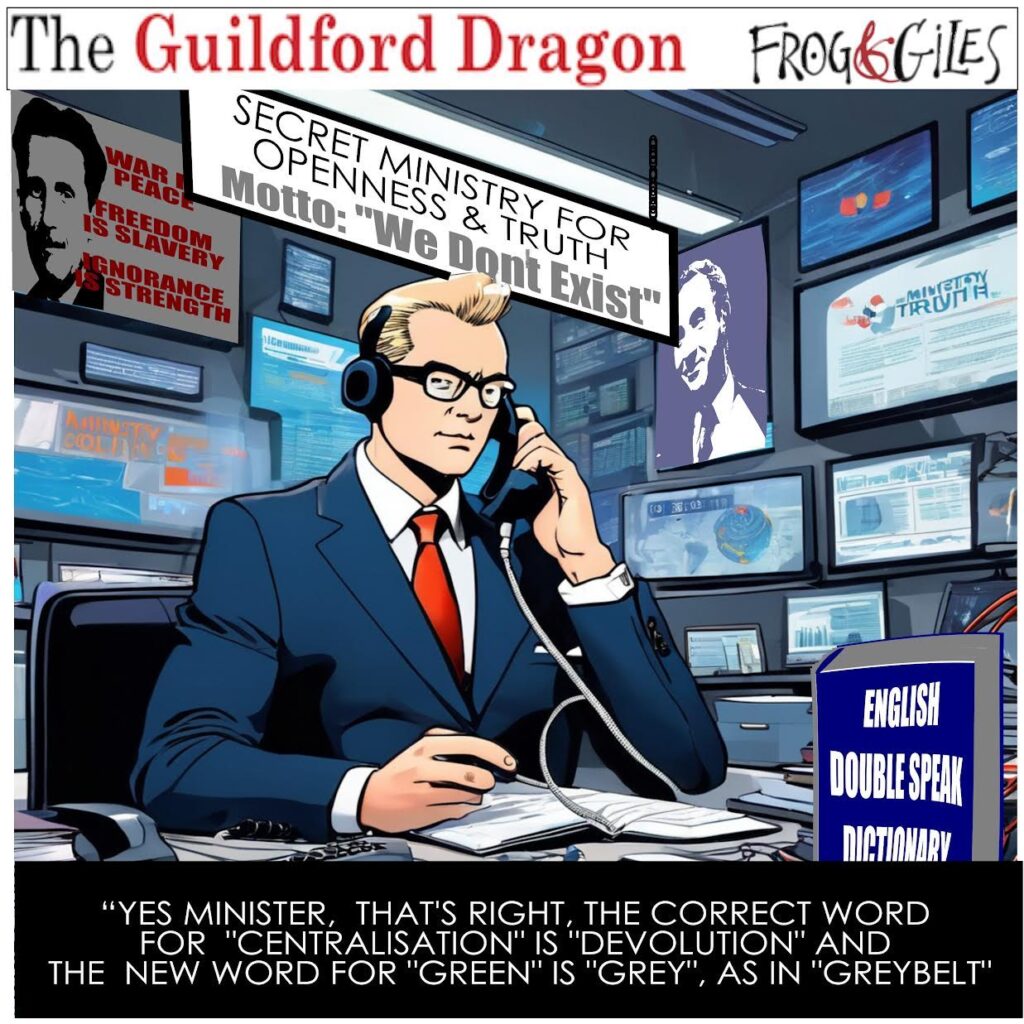 Abraham Lincoln
If given the truth, the people can be depended upon to meet any national crisis...
Abraham Lincoln
If given the truth, the people can be depended upon to meet any national crisis...
 Guildford news...
for Guildford people, brought to you by Guildford reporters - Guildford's own news service
Guildford news...
for Guildford people, brought to you by Guildford reporters - Guildford's own news service
Letter: A Surge of Discontent Calls for Accountability and Change
Published on: 28 Dec, 2024
Updated on: 30 Dec, 2024
Since the July General Election, the public’s dissatisfaction with the government has grown at an alarming rate, culminating in a UK-wide petition calling for a fresh election.
The petition reads: “I would like there to be another General Election. I believe the current Labour Government has gone back on the promises made during the last election campaign.”
Launched on December 6, this petition has been little short of a phenomenon. By Christmas Day, it had surpassed three million signatures (3,005,175 at 7pm) and continues to gather momentum. While it’s unlikely to beat the 6.1 million signatures of the 2019 petition for Brexit, it is quickly catching up with the 4.2 million signatures achieved by the 2016 petition — and it’s only been a few short weeks, becoming the third largest in the history of UK petitions.
At the heart of this petition lies a simple but powerful frustration: broken promises. The Labour Government, having campaigned on a platform of hope and change, is now facing increasing anger over its failure to deliver on key pledges.
 People feel that the economic policies, housing plans, and a lack of accountability are making life harder for the very citizens who put the government in power. In Surrey, a particularly heated debate is brewing over the government’s “English Devolution White Paper” (released December 16), a document that promises sweeping changes to local governance.
People feel that the economic policies, housing plans, and a lack of accountability are making life harder for the very citizens who put the government in power. In Surrey, a particularly heated debate is brewing over the government’s “English Devolution White Paper” (released December 16), a document that promises sweeping changes to local governance.
While some local political groups in Guildford Borough Council (GBC) are broadly supportive, many residents are likely to incline towards the Leader of the Guildford Greenbelt Group’s more realistic views (see:Local Political Leaders Respond to Publication of the English Devolution White Paper).
Guildford, home to a burgeoning space and technology industry, is grappling with severe traffic congestion and a strained infrastructure. The population is growing, but local services and roads can barely keep up. So, the question on many minds is: how can a vision of greater local powers and development coexist with the reality of overburdened infrastructure?
Adding much fuel to the fire, the government’s demand for GBC to double the number of homes in its Local Plan (see: Surrey’s Annual Housing Target Now at 10,981 – Council Pleas Ignored) has become a major point of tension.
The fear of losing green spaces, the destruction of agricultural land, and the inability to cope with the demand for more housing are real and legitimate concerns for local leaders. These aren’t unique to Surrey either.
Across the UK, people are grappling with the same issues: too much housing, too little infrastructure, and a government seemingly out of touch with local needs.
Of course, one factor that weighs heavily on the housing debate is the country’s struggle to deal with immigration. While immigration is often framed as a positive contributor to the economy, the simple fact is that our housing market wasn’t designed to accommodate the massive influx of people.
Communities are already at breaking point trying to provide enough homes for their existing populations. Now, with housing pressures compounded by increased immigration, frustration is bubbling over.
In this climate of widespread discontent, it is no surprise that populist movements are gaining traction. Nigel Farage’s Reform Party, while still a relatively minor force, is capitalising on the public’s disillusionment with the political establishment.
It’s evident in regional pockets of support, like Clacton, Farage’s constituency, where one in six active voters from the July election have signed the petition. In Godalming and Ash the figure is one in eleven and in the Guildford constituency, the figure is one in fifteen. While this level of support is not yet enough to trigger a new election, it’s a clear indication that public sentiment is shifting.
A surprisingly quirky detail in the table of UK citizens who have voted and are recorded as living overseas reveals that twenty-one reside in Russia, fifty-three in China, and even two in Iran—quite an intriguing mix of locations! Even more surprising, however, is that the ‘bots’ appear to have yet to crack the UK Government-sponsored petition software!
The petition is more than just a call for a fresh election — it’s a conversation starter about bigger issues. It’s a statement on the growing concerns around immigration, the economy, and the lack of government transparency. It’s about feeling unheard, feeling that those in power are out of touch with the everyday struggles of the people they serve.
National policies are also adding to this sense of alienation. For example, the proposed changes to the inheritance tax regime threaten the viability of family farms, with beneficiaries now facing massive tax bills.
At the same time, the proposed increases in National Insurance levies will hit businesses hard, stoking fears that the very measures intended to support economic growth might end up stifling it. These policies have intensified a broader sense of economic inequality and a growing distrust of those in power.

Note, “active vote” means the number who took part in the last general election. A surprisingly quirky detail in the table of UK citizens who have voted and are recorded as living overseas reveals that twenty-one reside in Russia, fifty-three in China, and even two in Iran—quite an intriguing mix of locations. Even more surprising, however, is that the ‘bots’ appear to have yet to crack the UK Government-sponsored petition software!
This wave of discontent is not confined to rural areas. Across urban constituencies, including many Labour-held seats, people are increasingly dissatisfied. A look at the map showing petition figures by UK constituency graphically illustrates how widespread this frustration is. From north to south, east to west, people are sending a clear message: they want change.
As populist movements rise in the UK and across Europe and the United States, there are growing concerns about the direction the political landscape is heading. The UK is not immune to the rise of divisive, reactionary politics, and the lessons of history warn us of the dangers such movements bring.
We’ve seen it before with figures like Boris Johnson, who swept in on a wave of populist sentiment only to suffer a dramatic fall. If anything, this serves as a reminder of the power of the people and the consequences of ignoring their concerns.
In conclusion, while the petition may not lead to an immediate election, it is a clear indicator that people are demanding accountability and change. It’s a wake-up call for the government to listen to the public’s concerns and take meaningful action.
But will Parliament, when it convenes on January 6 to debate the petition, actually respond to the growing discontent? I fear that we may be expecting too much.
This isn’t just a political issue — it’s about the future of our communities, the stability of our economy, and the trust we place in those who represent us. If that trust continues to erode, the consequences will reverberate far beyond the comfortable corridors of power in Westminster, affecting the lives of ordinary citizens across the country.
Responses to Letter: A Surge of Discontent Calls for Accountability and Change
Leave a Comment Cancel reply
Please see our comments policy. All comments are moderated and may take time to appear. Full names, or at least initial and surname, must be given.Recent Articles
- Loseley House Closed for ‘Gentlemanly’ Filming
- Opening 3-0 Loss for City But Scoreline Does Not Tell the Whole Story
- Letter: Worplesdon Parish Council – Only Guilty of Being Good
- ‘Emergency’ Roadworks Commence Without Warning, Closing Portsmouth Road
- Police Investigate Public Order Offence in Walnut Tree Close
- Woman Arrested After Guildford Town Centre Assault – Witnesses Sought
- Guildford Among Top Quarter for Recycling Rejection Rates in the South East, New Data Reveals
- Highways Bulletin: Roadside Rangers Making a Visible Difference Across Surrey
- Letter: The Enduring Role of Parish and Town Councils
- Mr Carpenter’s Byfleet Seedling and Other Varieties of Apples



Recent Comments
- Ian Macpherson on ‘Emergency’ Roadworks Commence Without Warning, Closing Portsmouth Road
- Jeremy Holt on Police Investigate Public Order Offence in Walnut Tree Close
- Gavin Morgan on Letter: The Enduring Role of Parish and Town Councils
- Tanya Scrivener on Letter: The Enduring Role of Parish and Town Councils
- Jim Allen on Letter: The Enduring Role of Parish and Town Councils
- Jim Allen on Letter: The Enduring Role of Parish and Town Councils
Search in Site
Media Gallery
Dragon Interview: Local Artist Leaves Her Mark At One of England’s Most Historic Buildings
January 21, 2023 / No Comment / Read MoreDragon Interview: Lib Dem Planning Chair: ‘Current Policy Doesn’t Work for Local People’
January 19, 2023 / No Comment / Read MoreA3 Tunnel in Guildford ‘Necessary’ for New Homes, Says Guildford’s MP
January 10, 2023 / No Comment / Read More‘Madness’ for London Road Scheme to Go Ahead Against ‘Huge Opposition’, Says SCC Leader
January 6, 2023 / No Comment / Read MoreCouncillor’s Son Starts Campaign for More Consultation on North Street Plan
December 30, 2022 / No Comment / Read MoreCounty Council Climbs Down Over London Road Works – Further ‘Engagement’ Period Announced
December 14, 2022 / No Comment / Read MoreDragon Interview: GBC Reaction to the Government’s Expected Decision to Relax Housing Targets
December 7, 2022 / No Comment / Read MoreHow Can Our Town Centre Businesses Recover? Watch the Shop Front Debate
May 18, 2020 / No Comment / Read More













Brian Creese
December 29, 2024 at 8:21 pm
I fear John Ferns does not understand the British electoral system. We elect governments at a general election where every registered elector has their say; we do not change governments as a result of tiny, biased petitions organised by particular interest groups.
Mr Ferns was clearly not paying enough attention during the election when Labour put building a million more homes at the centre of its campaign, since he now seems to think this policy is a surprise.
He criticises the increase in National Insurance payments without saying how he would raise the money we need to keep essential services – most notably the NHS – running after over a decade of savage cuts.
Politics is a matter of choices, and these choices are a result of a philosophical approach. This government has set out to rectify our chronic housing crisis, the collapse of public services and a society which becomes more unequal by the day. It will be judged at the next general election, not some pointless petition.
Brian Creese is a Labour party activist
John Perkins
January 1, 2025 at 2:50 pm
Pointing out that a petition has reached three million votes does not in any way imply that, “John Ferns does not understand the British electoral system”. Furthermore, since when was three million regarded as tiny and what evidence does Brian Creese have that the petition is biased?
Whilst building 1.5 million houses (presumably a very tiny number) was announced during the Labour party conference in 2023, it did not play a central role in the election and no actual figure was mentioned in the manifesto.
Making the claim that there has been a decade of savage cuts flies in the face of reality, especially when genuine Government figures are available online.
John Hawthorne
December 31, 2024 at 2:57 pm
I certainly think we should re-join the EU.
I don’t think any party wants to give what the British public now want namely an EU passport once again.
Let’s do some real reform and rejoin.
John Perkins
January 1, 2025 at 2:12 pm
Mr Hawthorne is, of course, entitled to his opinion.
But perhaps he could provide a reputable source for the otherwise baseless claim of “what the British public now want”.
In what way can a return to 2019 be described as reform?
David Roberts
January 1, 2025 at 3:56 pm
Does anyone know of any petition that ever made any difference to anything? I cannot think of one that did during my 33-years as a public servant.
Petitions are most common in dictatorships like China, where normal political activity is forbidden and the citizen’s only recourse is to beg favours from leaders, which simply reinforces their control and authority. Democracies are beyond this, but real politics requires engagement, struggle and compromise – so much more difficult than just feeling smug about signing an online form. Some petitions are an act of desperation, but most are just an abdication of civic responsibility.
We moan non-stop about the short-termism of politicians, so surely Labour should be allowed more than six months to bring us some benefit. If Mr Creese, however, thinks that setting a fantasy target for housebuilding will solve the housing crisis, he must have capitulated to the capitalist land-bankers, price-hikers and foreign speculators who are rigging the UK property market. Labour is doing nothing to correct these market distortions.
As we see in Guildford, planning rules are not a serious constraint on development and fiddling with them is just a political distraction.
John Ferns
January 1, 2025 at 5:44 pm
I appreciate that Brian Creese is speaking from the narrow perspective of the Labour Party, but that doesn’t change the fact that his leader and his team are making a real mess of governing the country. And just to clarify, I don’t read the Daily Mail or the Sun.
Who exactly is going to build the million homes? How many Eastern European workers are we going to have to import, and where will they live? What concrete measures are in place to tackle the underlying issues of infrastructure and housing affordability?
If the first 173 days of this Labour government are any indication, and if the same approach continues over the next four or more years, we have serious cause to fear for the future of this country.
Ben Paton
January 1, 2025 at 7:08 pm
Even more importantly, who are the million homes for? Local Plans are premised upon the concept of “housing need” which, in turn, is premised on Office for National Statistics population projections. The ONS has acknowledged that its projections for Guildford were exaggerated or wrong. Moreover, projected births less deaths show that there is no natural population increase in this borough and therefore limited need for new houses.
It is a safe bet that 1.5 million homes will not be built. The only times in history when that many homes were constructed were when the Government itself built houses – council houses – after World War 2. This Labour Government now apes the Conservative Party’s policies. Its belief in outsourcing is more dogmatic than Mrs Thatcher’s and its belief in “market forces” is much more naive.
Barbara Ford
January 1, 2025 at 7:03 pm
It seems odd, after the first change of government for 14 years, to be seeking another change only six months later. That would certainly negate one of the great benefits of our system, the stability afforded by the orderly transfer of power, achieved by the acceptance of election results – sorely tested by Brexit, but still holding.
And what if Mr Ferns and the rest of the three million had their way and were granted a new general election, but then didn’t like the result of that one either (the other 45 million UK electors might not share his views)? Another petition?